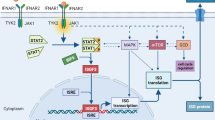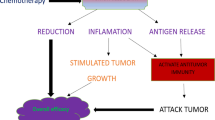Abstract
Flavone acetic acid (FAA) is a synthetic flavonoid with dramatic pre-clinical anti-tumour activity involving a vascular component in its mechanism but no clinical effects have been seen to date. As FAA also has immunomodulatory activity, immunological factors might explain differences in activity between mouse and man. This study examines the influence of host immune status on the anti-tumour activity of FAA. Two human colon tumour xenografts (COBA, HT-29) fail to respond to FAA in nude mice. The lack of activity of FAA against HT-29 xenografts cannot be explained on the basis of limited drug bioavailability as achievable plasma, and tumour levels of FAA are similar to those seen in sensitive murine colon tumours. The immune status of the host also influences the activity of FAA against two transplantable tumours of the mouse colon. Both these tumours are highly responsive to FAA in their normal NMRI hosts, but neither tumours exhibited significant growth delay in thymectomised NMRI or nude hosts. Histological examination of treated tumours revealed significant areas of haemorrhagic necrosis in all three hosts. These data suggest a clear immunological component in the mechanism of action of FAA which is separate from the previously described haemorrhagic necrosis.
Similar content being viewed by others
Author information
Authors and Affiliations
Rights and permissions
About this article
Cite this article
Bibby, M., Phillips, R., Double, J. et al. Anti-tumour activity of flavone acetic acid (NSC 347512) in mice – influence of immune status. Br J Cancer 63, 57–62 (1991). https://doi.org/10.1038/bjc.1991.12
Issue Date:
DOI: https://doi.org/10.1038/bjc.1991.12
- Springer Nature Limited
This article is cited by
-
Identification of human-selective analogues of the vascular-disrupting agent 5,6-dimethylxanthenone-4-acetic acid (DMXAA)
British Journal of Cancer (2013)
-
Dissection of stromal and cancer cell-derived signals in melanoma xenografts before and after treatment with DMXAA
British Journal of Cancer (2012)
-
In vivo and in vitro evaluation of combretastatin A-4 and its sodium phosphate prodrug
British Journal of Cancer (1999)
-
Interaction between endotoxin and the antitumour agent 5,6-dimethylxanthenone-4-acetic acid in the induction of tumour necrosis factor and haemorrhagic necrosis of colon 38 tumours
Cancer Chemotherapy and Pharmacology (1994)
-
The comparative disposition of the pyrolloquinone GR63178A and its 9-hydroxy metabolite GR54374X in sensitive and resistant mouse colon adenocarcinoma
Cancer Chemotherapy and Pharmacology (1993)




